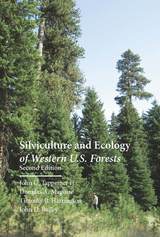2 books about Silviculture

A Critique of Silviculture
Managing for Complexity
Klaus J. Puettmann, K. David Coates, and Christian Messier
Island Press, 2008
The discipline of silviculture is at a crossroads. Silviculturists are under increasing pressure to develop practices that sustain the full function and dynamics of forested ecosystems and maintain ecosystem diversity and resilience while still providing needed wood products. A Critique of Silviculture offers a penetrating look at the current state of the field and provides suggestions for its future development.
The book includes an overview of the historical developments of silvicultural techniques and describes how these developments are best understood in their contemporary philosophical, social, and ecological contexts. It also explains how the traditional strengths of silviculture are becoming limitations as society demands a varied set of benefits from forests and as we learn more about the importance of diversity on ecosystem functions and processes.
The authors go on to explain how other fields, specifically ecology and complexity science, have developed in attempts to understand the diversity of nature and the variability and heterogeneity of ecosystems. The authors suggest that ideas and approaches from these fields could offer a road map to a new philosophical and practical approach that endorses managing forests as complex adaptive systems.
A Critique of Silviculture bridges a gap between silviculture and ecology that has long hindered the adoption of new ideas. It breaks the mold of disciplinary thinking by directly linking new ideas and findings in ecology and complexity science to the field of silviculture. This is a critically important book that is essential reading for anyone involved with forest ecology, forestry, silviculture, or the management of forested ecosystems.
The book includes an overview of the historical developments of silvicultural techniques and describes how these developments are best understood in their contemporary philosophical, social, and ecological contexts. It also explains how the traditional strengths of silviculture are becoming limitations as society demands a varied set of benefits from forests and as we learn more about the importance of diversity on ecosystem functions and processes.
The authors go on to explain how other fields, specifically ecology and complexity science, have developed in attempts to understand the diversity of nature and the variability and heterogeneity of ecosystems. The authors suggest that ideas and approaches from these fields could offer a road map to a new philosophical and practical approach that endorses managing forests as complex adaptive systems.
A Critique of Silviculture bridges a gap between silviculture and ecology that has long hindered the adoption of new ideas. It breaks the mold of disciplinary thinking by directly linking new ideas and findings in ecology and complexity science to the field of silviculture. This is a critically important book that is essential reading for anyone involved with forest ecology, forestry, silviculture, or the management of forested ecosystems.
[more]

Silviculture and Ecology of Western U.S. Forests
John D. Bailey
Oregon State University Press, 2015
Silviculture, once regarded solely as reforestation and growing trees for timber, is understood today as also maintaining forest health, reducing fire potential, benefitting wildlife and aesthetics, and ensuring multiple options for the future against the uncertainties of a changing climate.
Silviculture and Ecology of Western U.S. Forests, Second Edition, is a text for students, professional forest managers, and scientists that summarizes both early and contemporary research and principles relevant to the silviculture, ecology, and multi-purpose management of western U. S. forests. Based on its authors’ significant experiences and contributions in the field, as well as nearly 1000 additional references, Silviculture and Ecology remains the only text that focuses on silviculture in western U.S. forests—providing background and basis for current biological, ecological, and managerial practices.
Detailed chapters on fire, tree growth, and management of complex stand structures, as well as shrub ecology and an ecosystem framework, are bolstered in the second edition. A new series of case studies illustrates how silvicultural practices are developed and modified as forests grow and new challenges and opportunities occur. Contemporary silvicultural practices, particularly pertaining to fire use, vegetation management, soil fertility, and fertilization have been updated, and modifications that enhance standard practices are demonstrated throughout the text.
In this comprehensive reference, readers entering the field will come to understand the significance of carefully managing forests by conscious design, and experienced silviculturists will benefit from the edition’s up-to-date information, providing forest users with a greater range of ecosystem services and consumable products alike.
Silviculture and Ecology of Western U.S. Forests, Second Edition, is a text for students, professional forest managers, and scientists that summarizes both early and contemporary research and principles relevant to the silviculture, ecology, and multi-purpose management of western U. S. forests. Based on its authors’ significant experiences and contributions in the field, as well as nearly 1000 additional references, Silviculture and Ecology remains the only text that focuses on silviculture in western U.S. forests—providing background and basis for current biological, ecological, and managerial practices.
Detailed chapters on fire, tree growth, and management of complex stand structures, as well as shrub ecology and an ecosystem framework, are bolstered in the second edition. A new series of case studies illustrates how silvicultural practices are developed and modified as forests grow and new challenges and opportunities occur. Contemporary silvicultural practices, particularly pertaining to fire use, vegetation management, soil fertility, and fertilization have been updated, and modifications that enhance standard practices are demonstrated throughout the text.
In this comprehensive reference, readers entering the field will come to understand the significance of carefully managing forests by conscious design, and experienced silviculturists will benefit from the edition’s up-to-date information, providing forest users with a greater range of ecosystem services and consumable products alike.
[more]
READERS
Browse our collection.
PUBLISHERS
See BiblioVault's publisher services.
STUDENT SERVICES
Files for college accessibility offices.
UChicago Accessibility Resources
home | accessibility | search | about | contact us
BiblioVault ® 2001 - 2024
The University of Chicago Press









